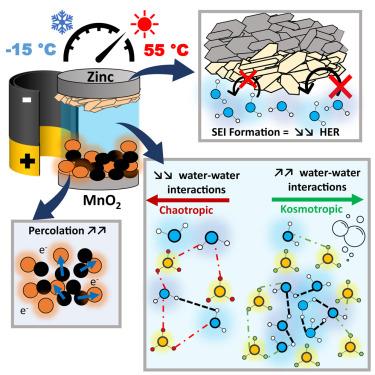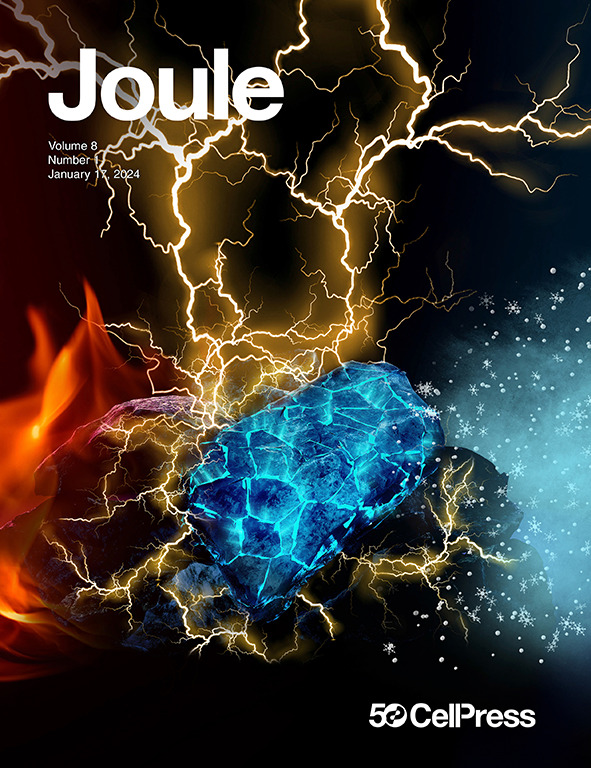A key advance toward practical aqueous Zn/MnO2 batteries via better electrolyte design
IF 38.6
1区 材料科学
Q1 CHEMISTRY, PHYSICAL
引用次数: 0
Abstract
Rechargeable aqueous devices, such as alkaline Zn/MnO2 batteries, hold strong potential for large-scale energy storage. However, they face limitations related to zinc and electrolyte degradation. Here, in the spirit of practicality, we have addressed these limitations by developing strategies aiming at resolving issues with the electrolyte, anode, and cathode independently at first, and then in synergy. We propose innovative electrolyte designs that incorporate select organic molecules to leverage hydrogen bonding interactions, reducing Zn nuclei reactivity via the formation of a stable solid electrolyte interphase (SEI). Our optimized Zn/MnO2 batteries demonstrate high stability, achieving a gravimetric capacity of ∼450 mAh/g (MnO2) and 90% capacity retention. Furthermore, we systematically show the scalability of our methods, moving from a Swagelok cell prototype (3–6 mg/cm2 of mass loading) to cylindrical-type cell (30 mg/cm2). These batteries can operate at unprecedentedly high temperatures of up to 55°C, while offering an energy density of 150 Wh/kg.

通过更好的电解质设计,向实用 Zn/MnO2 水电池迈出关键一步
碱性锌/二氧化锰电池等可充电水性设备在大规模能源储存方面具有巨大潜力。然而,它们面临着与锌和电解质降解有关的限制。在此,我们本着务实的精神,针对这些限制,制定了旨在解决电解质、阳极和阴极问题的策略,首先是独立解决,然后是协同解决。我们提出了创新的电解质设计方案,将精选的有机分子纳入其中,利用氢键相互作用,通过形成稳定的固体电解质间相(SEI)来降低锌核的反应性。我们优化的 Zn/MnO2 电池表现出很高的稳定性,重量计量容量达到 ∼450 mAh/g(MnO2),容量保持率达到 90%。此外,我们系统地展示了我们方法的可扩展性,从世伟洛克电池原型(3-6 毫克/平方厘米的质量负载)到圆柱型电池(30 毫克/平方厘米)。这些电池可以在高达 55°C 的前所未有的高温下工作,同时提供 150 Wh/kg 的能量密度。
本文章由计算机程序翻译,如有差异,请以英文原文为准。
求助全文
约1分钟内获得全文
求助全文
来源期刊

Joule
Energy-General Energy
CiteScore
53.10
自引率
2.00%
发文量
198
期刊介绍:
Joule is a sister journal to Cell that focuses on research, analysis, and ideas related to sustainable energy. It aims to address the global challenge of the need for more sustainable energy solutions. Joule is a forward-looking journal that bridges disciplines and scales of energy research. It connects researchers and analysts working on scientific, technical, economic, policy, and social challenges related to sustainable energy. The journal covers a wide range of energy research, from fundamental laboratory studies on energy conversion and storage to global-level analysis. Joule aims to highlight and amplify the implications, challenges, and opportunities of novel energy research for different groups in the field.
 求助内容:
求助内容: 应助结果提醒方式:
应助结果提醒方式:


